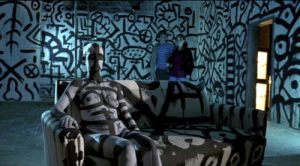An interesting “turn” that made an impression on me in Good Bye, Lenin (2004) was the celebration of German unification in the film with aesthetics of cultural liberation. While Alex is trying to distance his mother away from word of the unification, even he is can not help but get swept up in mass celebrations and gatherings. In fact, I counted three “parties” in the film. Alex’s “date” with Lara thrums with energy and extremely “out-there” costumed oddities. In between small-talk with Lara, Alex also narrates his observations on the fluctuating world of Berlin. I blinked though a whirlwind of images: abstract art, scenery, and a bombed-out apartment that looked abandoned since the Second World War. And would you believe it? This party scene is just roughly two minutes and thirty seconds, and I’m being generous by adding the last few beats of the previous scene. Honestly, if I was Wolfgang Becker (The film’s director), I would have been tempted to just cut this whole scene for being so short and out-of-place. But it has a purpose. Not only for advancing the relationship of Alex and Lara, but highlighting how Berlin is celebrating German unification in the months after the fall of the Berlin wall.

So, let’s see how far I can close read into two minutes and thirty seconds: First, Alex’s sarcastic comment that “we finally had our first romantic rendezvous” which does a quick cut to the the loud costumed party has it’s own set of implications that Alex is interesting in flipping the old conventions of a date. He calls it a “rendezvous” not a “date”, implying this was meant to be a private date after meeting in a public place. Alex and Lara try to get away from the music and lights of the party through a series of rapid camera shots. While I’m no expert in cinematography, I can definitely appreciate how the rapid pace of the scene matches the mood of the party. Each member of the band looks unique, as two of them wear different styles of masks and the other appears to be half-naked in body paint. Their appearance is a reminder that neither their music nor their fashion would be allowed under the GDP, and that a gathering of this size would have likely been raided by police. Then there’s the graffiti room. This struck for one as an artist’s expression of how it feels to be bombarded by GDP messages, with the color displaying a polarizing effect on the people. One is either black or white, East or West. The party also gave an impression that these people maybe had little else to do after the government collapsed, much like Author Christian Mackrodt who wrote Ostkreuz. Coming of Age during the Transition about feeling confused in post-GDP. In a few short months after the wall fell, the creative minds of East Berlin were free to make parties like Alex’s “rendezvous”.

When the Alex and Lara get to the top of the building, they find privacy in a bombed-out apartment that captured my attention. Alex discusses the transition of the city with hope, in that, “The winds of change blew on the ruins of our Republic. Summer came, and Berlin was the most beautiful place on Earth.” (2004) Since the two are in a ruined room with an open wall, the winds literally blew into the ruins. While destroyed, I could also find that this living room had a pretty 1940’s aesthetic. It is possible it was never changed or demolished since the Fall of Berlin in 1945. The juxtaposition of old with new (the winds of change and the party around them) in this scene connects especially well to Alex’s new relationship with Lara. I say this because Alex mentions, “We were the center of the world, where things were finally happening. And we went with the flow.”(2004) This entire comment can be focused on the party, where celebration of unification brought life into parties in East Berlin. The popularity of open air parties meant spaces like this needed to be adapted to make things happen. At the same time, I also believe Alex’s new relationship with Lara felt to him like “the center of the world”, in which he feels fulfillment in his own life was “finally happening”. As a result, this party scene is not only about celebrating liberation and unification, it is about Alex as he discovers bond with Lara.
